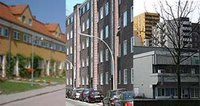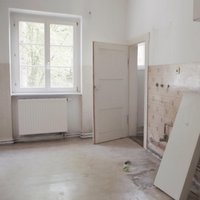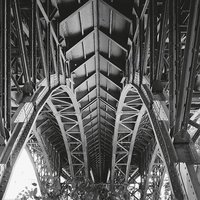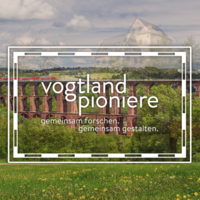Ongoing and Completed Projects on Cultural Heritage
Living in a Listed Building

Hamburg.Jarrestadt.Glindweg. Jarrestadt, Hölderlinsallee in Hamburg (24.4.2005) Wolfgang Meinhart, Hamburg, CC BY-SA 3.0
Köln Chorweiler Zentrum, Elke Wetzig, Creative Commons Attribution-Share Alike 4.0, February 13, 2005
The research project “Living in a Listed Building: Conservation and design of 20th century housing concepts and estates” contributes to a fundamental understanding of the (reciprocal) processes of evaluation and appreciation among different actors in relation to listed 20th century residential buildings, ensembles, and settlements and their inherent housing concepts. Residential properties, communities—and their access and participation in use and care, and in conservation and design—are systematically examined from the perspectives of both heritage conservation and housing research on participation and identification. The project, lead by Associate Professor Heike Oevermann and Professor Barbara Schönig, with the involvement of Professor Jasper Cepl & Professor Frank Eckardt, was approved for a period of 3 years.
The research project "Three Rooms, Kitchen, Hallway, Bathroom" has been in progress since 2017 in collaboration with Prof. Dr.-Ing. Barbara Schönig, Chair of Urban Planning, and Prof. Verena von Beckerath, Chair of Design and Housing, with the assistance of Jessica Christoph and Carsten Praum at the Bauhaus-Universität Weimar. Within the framework of the multi-year interdisciplinary and experimental project, concrete and ideal questions about the future of housing are being formulated, negotiated and researched using the example of the transformation of an existing flat in a listed building ensemble from the 1920s in Weimar. The project is accompanied by various guest contributions and the photographer Andrew Alberts, who visually documents the transformation and use of the flat.
Since 2016, the Research Training Group "Identity and Heritage" has been working on questions of cultural heritage research. The research focuses on the question of how certain groups construct their identities by carrying certain parts of the past forward into the present. The programme brings together postgraduate students and professors from the Technische Universität Berlin, the Bauhaus-Universität Weimar, the Anhalt University of Applied Sciences Dessau and the University of Applied Sciences Erfurt.
The DFG Focus Programme "Cultural Heritage Construction" focuses on buildings of the high modern era (around 1880 to 1970). Their value as monuments is often determined by structural characteristics - the construction thus becomes the actual cultural heritage. To date, however, there has been a lack of decisive foundations in the history of building technology, monument theory and engineering science for its evaluation and preservation.
The old Polish royal city of Krakow is home to one of the oldest universities and one of the most important libraries in Europe. A German-Polish team is researching largely unexplored letter and manuscript material from the Varnhagen Collection, one of the largest and most important autograph collections of the 19th century. The goals of the project are to create a digital platform on which digital copies of the letters, manuscripts, transcriptions and contextual material will be available worldwide free of charge, as well as to explore the network of the selected female authors through editing and contextualisation.
The research project " Vogtland Pioneers: Future Index Homeland and Building Culture 2025" examines the perception of the industrial cultural heritage in the Vogtland region in the border area of Thuringia, Saxony, Bavaria and Bohemia. It is funded by the BMBF as a priority project in the programme "WIR! - Wandel durch Innovation in der Region" (Change through Innovation in the Region) as part of the project alliance "Vogtlandpioniere" (Vogtland Pioneers) between 2020 and 2023.






